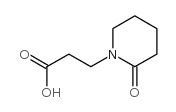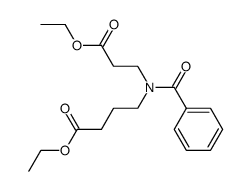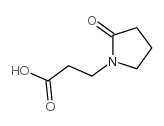4386-03-2
| Name | Carboxyethyl-γ-aminobutyric acid |
|---|---|
| Synonyms | 4-(2-carboxyethylamino)butanoic acid |
| Density | 1.232g/cm3 |
|---|---|
| Boiling Point | 409.2ºC at 760mmHg |
| Molecular Formula | C7H13NO4 |
| Molecular Weight | 175.18200 |
| Flash Point | 201.3ºC |
| Exact Mass | 175.08400 |
| PSA | 86.63000 |
| LogP | 0.30640 |
| Index of Refraction | 1.491 |
|
Version 1.2
Regulation (EC) No 1907/2006 1 - Product and Company Information Product NameCARBOXYETHYL-GAMMA-AMINOBUTYRIC ACID HYBRI-MAX 2 - Hazards Identification 3 - Composition/Information on Ingredients Product NameCAS #EC noAnnex I Index Number CARBOXYETHYL-GAMMA-AMINOBUTYRIC 4386-03-2 224-497-0 None ACIDAPPROX. 97% FormulaC7H13NO4 Molecular Weight 175,2000 AMU SynonymsButyric acid, 4-((2-carboxyethyl)amino)- (6CI,7CI,8CI) * 4-((2-Carboxyethyl)amino)butanoic acid * Carboxyethyl-gamma-aminobutyric acid * Spermidic acid 4 - First Aid Measures AFTER INHALATION If inhaled, remove to fresh air. If breathing becomes difficult, call a physician. AFTER SKIN CONTACT In case of skin contact, flush with copious amounts of water for at least 15 minutes. Remove contaminated clothing and shoes. Call a physician. AFTER EYE CONTACT In case of contact with eyes, flush with copious amounts of water for at least 15 minutes. Assure adequate flushing by separating the eyelids with fingers. Call a physician. AFTER INGESTION SIGMAwww.molbase.com If swallowed, wash out mouth with water provided person is conscious. Call a physician. 5 - Fire Fighting Measures EXTINGUISHING MEDIA Suitable: Water spray. Carbon dioxide, dry chemical powder, or appropriate foam. SPECIAL RISKS Specific Hazard(s): Emits toxic fumes under fire conditions. SPECIAL PROTECTIVE EQUIPMENT FOR FIREFIGHTERS Wear self-contained breathing apparatus and protective clothing to prevent contact with skin and eyes. 6 - Accidental Release Measures PROCEDURE(S) OF PERSONAL PRECAUTION(S) Wear protective equipment. METHODS FOR CLEANING UP Sweep up, place in a bag and hold for waste disposal. Avoid raising dust. Ventilate area and wash spill site after material pickup is complete. 7 - Handling and Storage 8 - Exposure Controls / Personal Protection ENGINEERING CONTROLS Mechanical exhaust required. PERSONAL PROTECTIVE EQUIPMENT Respiratory Protection: Use respirators and components tested and approved under appropriate government standards such as NIOSH (US) or CEN (EU). Respiratory protection is not required. Where protection from nuisance levels of dusts are desired, use type N95 (US) or type P1 (EN 143) dust masks. Hand Protection: Compatible chemical-resistant gloves. Eye Protection: Chemical safety goggles. 9 - Physical and Chemical Properties AppearancePhysical State: Solid PropertyValueAt Temperature or Pressure pHN/A BP/BP RangeN/A MP/MP RangeN/A Flash PointN/A FlammabilityN/A Autoignition TempN/A Oxidizing PropertiesN/A Explosive PropertiesN/A Explosion LimitsN/A Vapor PressureN/A Partition CoefficientN/A SIGMAwww.molbase.com ViscosityN/A Vapor DensityN/A Saturated Vapor Conc. N/A Evaporation RateN/A Bulk DensityN/A Decomposition Temp.N/A Solvent ContentN/A Water ContentN/A Surface TensionN/A ConductivityN/A Miscellaneous DataN/A SolubilityN/A 10 - Stability and Reactivity STABILITY Stable: Stable. Materials to Avoid: Strong oxidizing agents. HAZARDOUS DECOMPOSITION PRODUCTS Hazardous Decomposition Products: Carbon monoxide, carbon dioxide, and nitrogen oxides. HAZARDOUS POLYMERIZATION Hazardous Polymerization: Will not occur 11 - Toxicological Information RTECS NUMBER: EK7730000 ACUTE TOXICITY LD50 Intraperitoneal Rat 877 MG/KG LD50 Intraperitoneal Mouse 783 MG/KG ROUTE OF EXPOSURE Skin Contact: May cause skin irritation. Eye Contact: May cause eye irritation. Multiple Routes: May be harmful by inhalation, ingestion, or skin absorption. CONDITIONS AGGRAVATED BY EXPOSURE The toxicological properties have not been thoroughly investigated. 12 - Ecological Information No data available. 13 - Disposal Considerations SUBSTANCE DISPOSAL Dissolve or mix the material with a combustible solvent and burn SIGMAwww.molbase.com in a chemical incinerator equipped with an afterburner and scrubber. Observe all federal, state, and local environmental regulations. 14 - Transport Information RID/ADR Non-hazardous for road transport. IMDG Non-hazardous for sea transport. IATA Non-hazardous for air transport. 15 - Regulatory Information COUNTRY SPECIFIC INFORMATION Germany WGK: 3 Self-Classification 16 - Other Information WARRANTY The above information is believed to be correct but does not purport to be all inclusive and shall be used only as a guide. The information in this document is based on the present state of our knowledge and is applicable to the product with regard to appropriate safety precautions. It does not represent any guarantee of the properties of the product. Inc., shall not be held liable for any damage resulting from handling or from contact with the above product. See reverse side of invoice or packing slip for additional terms and conditions of sale. Copyright 2010 Co. License granted to make unlimitedpaper copies for internal use only. DISCLAIMER For R&D use only. Not for drug, household or other uses. SIGMAwww.molbase.com SECTION 16 - ADDITIONAL INFORMATION N/A |
CHEMICAL IDENTIFICATION
HEALTH HAZARD DATAACUTE TOXICITY DATA
|
| RIDADR | NONH for all modes of transport |
|---|---|
| WGK Germany | 3 |
| RTECS | EK7730000 |
| HS Code | 2922499990 |
|
~% 
4386-03-2 |
| Literature: Yokoo et al. Nippon Kagaku Zasshi, 1956 , vol. 77, p. 599,601 Chem.Abstr., 1958 , p. 9070 |
|
~% 
4386-03-2 |
| Literature: Yokoo et al. Nippon Kagaku Zasshi, 1956 , vol. 77, p. 599,601 Chem.Abstr., 1958 , p. 9070 |
|
~% 
4386-03-2 |
| Literature: Yokoo et al. Nippon Kagaku Zasshi, 1956 , vol. 77, p. 599,601 Chem.Abstr., 1958 , p. 9070 |
| Precursor 1 | |
|---|---|
| DownStream 1 | |
| HS Code | 2922499990 |
|---|---|
| Summary | HS:2922499990 other amino-acids, other than those containing more than one kind of oxygen function, and their esters; salts thereof VAT:17.0% Tax rebate rate:9.0% Supervision conditions:AB(certificate of inspection for goods inward,certificate of inspection for goods outward) MFN tariff:6.5% General tariff:30.0% |



